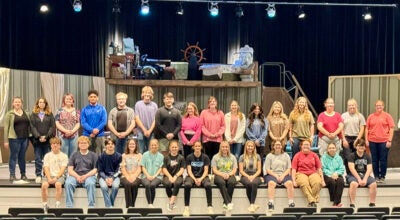Murder scene witness: I got out
Published 12:02 am Thursday, August 27, 2015
Man testifies he saw Barton’s body, fled
A man whose fingerprints were found on an open potato chip bag at the scene where James “Nibby” Barton was murdered, but whose identity had remained a mystery for decades, testified yesterday in the ongoing murder trial of Eugene Black.
Defense attorney Peter Bush introduced jurors to Michael James Hyde, who testified that he went in Barton’s store on May 2, 1994, to buy a drink and chips, waited for a clerk to appear, then noticed Barton’s body behind the counter.
Hyde, who said he was born in Vietnam and moved to Covington County in about 1987, moved to Hawaii after graduating from high school.
In the spring of 1994, Hyde was visiting his parents in Covington County when he went to Barton’s store. He said he could not remember what time it was, but estimated it was between noon and 5 or 6 p.m.
“At first I didn’t see anything,” he said. “I went and grabbed a soda and a bag of chips, went to the counter to pay. After a while, I was waiting for somebody to come to the counter. I observed a body behind the counter.”
Hyde told Bush that he “went around to make sure the person was OK.”
Hyde, who appeared shaken at the memory of the day, said, “I can’t remember what I did. I remember seeing he was not OK. I got out of the store as quickly as I could.”
Hyde said he didn’t see anybody else in the store, and didn’t recall seeing anyone on the road. He said his return tickets to Hawaii were for the following day.
Asked why he didn’t report what he saw, Hyde said, “At the time I was scared. And I wasn’t from around here anymore. I didn’t live here. I was going back the next day. I didn’t see how I could help the situation any, and I didn’t want any additional problems for myself.”
Hyde said, “At the time it happened, I didn’t know what I’d walked in on. Something that could have still been in progress. And I certainly didn’t want to get accused of the crime.
“I didn’t see how I could have helped the situation in any way,” he said.
Previously, Mark Crews, a former forensics investigator with the Alabama Department of Forensic Science who assisted with the 1994 investigation, had testified there was an open bag of potato chips and a root beer bottle on the counter.
The recent matching of the fingerprints came to light in a pretrial hearing last week, and sources close to the case say they were very matched by a databank in the Midwest. The fingerprints have not been discussed in court.
The jury also heard from a weapons expert who said a bullet found at the scene could have been fired from a number of different weapons. The state introduced a pistol made in Romania as “demonstrative evidence,” and asked if the ammunition could have been fired by a similar weapon.
The expert said he could not answer that without consulting literature.
Shelia Walker Williams, who also was charged with robbery and murder in Barton’s death and accepted a plea deal earlier this week (see related story), testified for the defense.
Williams said she knew Sandra Ellison Lynn, who also was charged and testified for the state, and Lynn’s sister, Sheila Ellison Brooks, who died of natural causes after she was charged in the crime.
Williams testified she had known the women all of her life, and that she had never seen Brooks drive. A previous witness claimed to have seen Brooks driving a white vehicle away from Barton’s store on the afternoon of the murder.
She said she knows nothing about the crime, but pled guilty because she felt the odds were stacked against her, “and they say I was passed out in the backseat.”
Taking the stand in his own defense, Black said he didn’t know Barton, and could only remember stopping in his store once, to buy cigarettes.
“I visited Mar-B Mart,” he said, referring to a nearby convenience store.
Black said he lived with Lynn beginning in the fall of 1991, and was living with her when he was injured in a work accident in May of 1992 when he fell 25 or 30 feet from a bridge in River Falls.
The accident caused significant injuries, he said, including a punctured lung, a compression fraction in his spine, and a broken pelvis.
“They had to cut me open and put everything back together,” he said. “I was a mess for a long time.”
He testified that he received workman’s compensation until Feb. 14, 1994, when he received a $50,000 settlement.
Black also went through a number of purchases he made after the settlement, but estimated he had $25,000 in his grandmother’s bank account at the time Barton was killed.
The only gun he had, he said, was a pistol he found in one of the used vehicles he purchased after his settlement. He said when he attempted to shoot a snake with it once, it misfired.
Black said he first learned of Barton’s death about a week after the murder, when Lynn was stopped at a roadblock at which officers were looking for information about the murder.
“I didn’t know the guy,” Black said. “She said she knew him. Said he was a nice guy.”
Black testified that during the time he and Lynn were together, they separated at least twice, and that she moved on after Black was arrested for possession of marijuana.
Black also testified that he, too, was offered a plea deal, but maintains his innocence.
Court resumes at 9 today, when the state is expected to present rebuttal witnesses.





